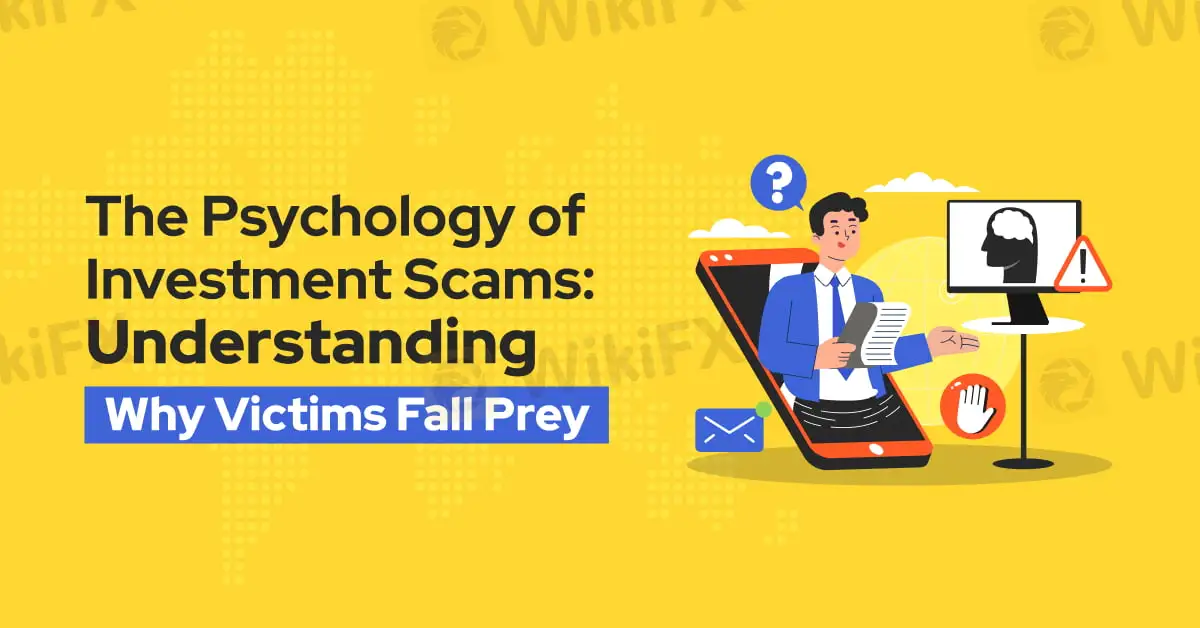Abstract:Investment scams have become increasingly sophisticated, preying on human psychology to exploit vulnerabilities. While these fraudulent schemes promise extraordinary returns, they often rely on psychological tactics to deceive victims. Understanding these factors can help traders recognise and avoid falling for scams.

Investment scams have become increasingly sophisticated, preying on human psychology to exploit vulnerabilities. While these fraudulent schemes promise extraordinary returns, they often rely on psychological tactics to deceive victims. Understanding these factors can help traders recognise and avoid falling for scams.
Fraudsters skillfully manipulate emotions to cloud rational decision-making. One of the primary drivers is greed, a natural inclination to seek financial gain with minimal effort. Scammers present offers that appear too lucrative to resist, appealing to the desire for quick wealth. By crafting opportunities that seem exclusive and high-yielding, they tap into this powerful motivator.

Fear, particularly the fear of missing out (FOMO), also plays a significant role. Fraudsters create a sense of urgency, claiming their investment opportunities are available for a limited time or to a select few. This tactic pressures individuals into making hasty decisions without proper due diligence, bypassing logical evaluation in favour of impulsive action.
Building trust is another cornerstone of investment scams. Fraudsters often present themselves as credible and professional, complete with polished websites, testimonials, and fabricated success stories. They simulate social proof by showcasing supposed investors who have achieved impressive returns. These fabricated narratives foster a false sense of security, making victims believe they are making a well-informed choice.
Hope is a particularly potent tool in the fraudsters arsenal. Many victims are driven by aspirations for financial freedom or a better future. Scammers exploit this optimism by framing their schemes as transformative opportunities. The promise of life-changing wealth often blinds individuals to the inherent risks, leaving them vulnerable to deception.
Lack of financial literacy is another significant factor that scammers exploit. Victims who are unfamiliar with investment principles may fail to identify warning signs. Fraudsters frequently use complex jargon or technical terms to create an illusion of expertise, overwhelming their targets and reducing their ability to critically assess the situation.
Once an individual has invested, the psychological principle of the sunk cost fallacy often comes into play. Victims feel compelled to continue investing in the hope of recouping their losses. This emotional attachment to the money already spent leads to deeper entanglement in the scam, exacerbating financial damage over time.
To safeguard against these traps, traders must adopt a vigilant and informed approach. Conducting thorough research is essential. Verifying the legitimacy of investment opportunities through licensed financial advisors or regulatory bodies can provide an added layer of protection. Unrealistic promises of guaranteed returns should immediately raise suspicion.
It is equally important to avoid rushed decisions. Fraudsters thrive on creating urgency. Taking the time to verify claims and seek independent advice is crucial. Developing financial literacy can further empower individuals to spot inconsistencies and recognise red flags.

To prevent falling victim to fraudulent schemes, using tools like WikiFX can be a game-changer. WikiFX provides detailed information on brokers, including regulatory status, customer reviews, and safety ratings, allowing users to verify the legitimacy of any investment platform before committing their money. With access to in-depth insights and risk alerts, WikiFX equips potential investors with the resources to make informed decisions and avoid unauthorised or unlicensed entities. By checking with WikiFX, users can confidently protect their savings and avoid the costly traps set by unscrupulous investment syndicates.
Ultimately, vigilance and critical thinking are the most effective defences against investment scams. By understanding the psychological tactics employed by fraudsters, traders can remain alert and avoid falling prey to deceit. In the world of investments, the golden rule remains: if it sounds too good to be true, it probably is.












